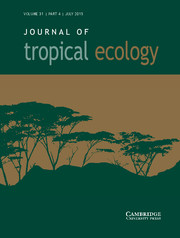Crossref Citations
This article has been cited by the following publications. This list is generated based on data provided by
Crossref.
Fenner, A. L.
and
Bull, C. M.
2007.
Short‐term impact of grassland fire on the endangered pygmy bluetongue lizard.
Journal of Zoology,
Vol. 272,
Issue. 4,
p.
444.
CARVALHO JR, ELILDO ALVES RIBEIRO
LIMA, ALBERTINA PIMENTEL
MAGNUSSON, WILLIAM ERNEST
and
ALBERNAZ, ANA LUISA KERTI MANGABEIRA
2008.
Long‐term effect of forest fragmentation on the Amazonian gekkonid lizards, Coleodactylus amazonicus and Gonatodes humeralis.
Austral Ecology,
Vol. 33,
Issue. 6,
p.
723.
Barlow, Jos
and
Silveira, Juliana M.
2009.
Tropical Fire Ecology.
p.
543.
Fadini, Rodrigo F.
and
Lima, Albertina P.
2012.
Fire and Host Abundance as Determinants of the Distribution of Three Congener and Sympatric Mistletoes in an Amazonian Savanna.
Biotropica,
Vol. 44,
Issue. 1,
p.
27.
Costa, Bernardo Miglio
Pantoja, Davi Lima
Vianna, Mariana Caixeta Milhome
and
Colli, Guarino Rinaldi
2013.
Direct and Short-Term Effects of Fire on Lizard Assemblages from a Neotropical Savanna Hotspot.
Journal of Herpetology,
Vol. 47,
Issue. 3,
p.
502.
Sousa, Heitor C. de
Soares, Ana Hermínia S.B.
Costa, Bernardo M.
Pantoja, Davi L.
Caetano, Gabriel H.
Queiroz, Tânia A. de
and
Colli, Guarino R.
2015.
Fire Regimes and the Demography of the LizardMicrablepharus atticolus(Squamata, Gymnophthalmidae) in a Biodiversity Hotspot.
South American Journal of Herpetology,
Vol. 10,
Issue. 3,
p.
143.
Valente, D M P
Zenker, M M
and
Teston, J A
2018.
Tiger-Moths in Savannas in Eastern Amazon: First Assessment of Diversity and Seasonal Aspects.
Neotropical Entomology,
Vol. 47,
Issue. 6,
p.
842.
Santos-Jr, Alfredo P.
Almeida-Santos, Danilo A.
Ribeiro, Síria
Carmargo, Isla C.M.
and
da Costa Prudente, Ana Lúcia
2019.
Distribution extension of Phimophis guerini (Serpentes: Dipsadidae: Xenodontinae) in the Brazilian Amazon.
Zoologia,
Vol. 36,
Issue. ,
p.
1.
Souza, E.
Lima, A.P.
Magnusson, W.E.
Kawashita-Ribeiro, R.
Fadini, R.
Ghizoni, I.R.
Ganança, P.
and
Fraga, R.
2021.
Short- and long-term effects of fire and vegetation cover on four lizard species in Amazonian savannas.
Canadian Journal of Zoology,
Vol. 99,
Issue. 3,
p.
173.
FADINI, RODRIGO F.
BROCARDO, CARLOS R.
ROSA, CLARISSA
ARAGÓN, SUSAN
LIMA, ALBERTINA P.
and
MAGNUSSON, WILLIAM E.
2021.
Long-term standardized ecological research in an Amazonian savanna: a laboratory under threat.
Anais da Academia Brasileira de Ciências,
Vol. 93,
Issue. suppl 4,
BERGALLO, HELENA G.
ROSA, CLARISSA
OCHOA, ANA C.
MANZATTO, ANGELO GILBERTO
GUIMARAES, ARETHA F.
BANHOS, AUREO
CASTILHO, CAROLINA V.
BARROS, CLAUDIA F.
NORRIS, DARREN
DRUCKER, DEBORA P.
RODRIGUES, DOMINGOS J.
BACCARO, FABRICIO B.
LOURENÇO, IGOR H.
ZUANON, JANSEN
STEGMANN, LIS F.
ANJOS, MARCELO R.
SILVEIRA, MARCOS
ARAÚJO, PATRICIA S.G.
BOBROWIEC, PAULO E.D.
FADINI, RODRIGO
NECKEL-OLIVEIRA, SELVINO
EMILIO, THAISE
SANTORELLI JUNIOR, SERGIO
and
MAGNUSSON, WILLIAM E.
2023.
Long-term Ecological Research: Chasing fashions or being prepared for fashion changes?.
Anais da Academia Brasileira de Ciências,
Vol. 95,
Issue. 3,


